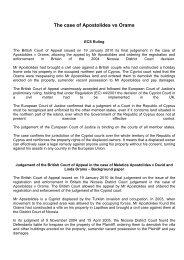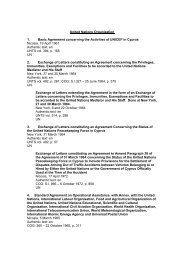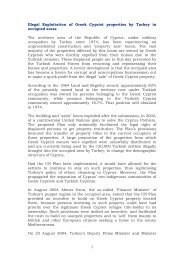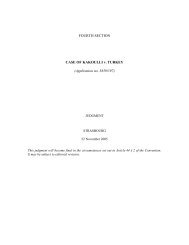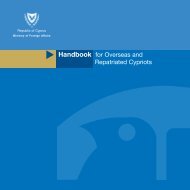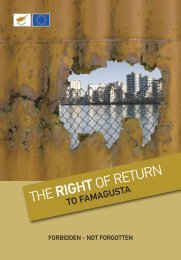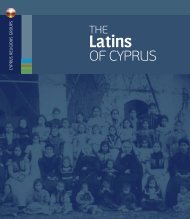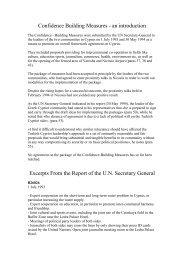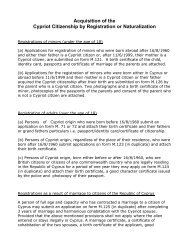Myra Xenides- Arestis v. Turkey
Myra Xenides- Arestis v. Turkey
Myra Xenides- Arestis v. Turkey
You also want an ePaper? Increase the reach of your titles
YUMPU automatically turns print PDFs into web optimized ePapers that Google loves.
XENIDES-ARESTIS v. TURKEY DECISION 31she emphasises that the respondent Government have at no stage in thirtyyears offered a legal justification for the interference with property.As regards the temporal aspect of the application and the question ofretrospective effect of the Law, the applicant maintains that on the date ofthe filing of her application, dating back to 1998, she had indeed compliedwith the requirement of exhaustion of domestic remedies under Article 35since then no effective domestic remedies were available to her. She notesthat, as admitted by the respondent Government in their observations, before23 April 2003 administrative and judicial remedies in the “TRNC” wereneither effective nor accessible to Greek Cypriots. In her view, <strong>Turkey</strong>cannot avoid this by purporting to set up a domestic remedy six years later.No exceptional circumstances have been put forward by the respondentGovernment justifying the departure of the Court from its normal practice,that is, considering the question of exhaustion on the dates on which theirapplications were lodged (Brusco v. Italy (dec.), no. 69789/01,ECHR 2001-IX). Thus, the applicant submits that the respondentGovernment have failed to discharge the required burden of proof inaccordance with the Court's case-law (Selmouni v. France [GC],no. 25803/94, ECHR 1999-V, and Djavit An v. <strong>Turkey</strong>, no. 20652/92,ECHR 2003-III). Finally, the applicant notes that, in view of the fact thatthere is no reference in the law itself concerning its retroactive effect or thatit covers cases that are already pending before the Court, it is to bepresumed that it does not purport to have such effect or ambit.(ii) Availability, effectiveness and adequacy of the remedy proposed under “Lawno. 49/2003”The applicant avers that, inter alia, under the provisions the Law she isnot recognised as the legal owner of her land, contrary to the Court's caselaw,she cannot claim restitutio in integrum and she is not given use andcontrol of her property. In the cases of Loizidou v. <strong>Turkey</strong> (merits, op. cit.),Cyprus v. <strong>Turkey</strong> (op. cit.), Demades v. <strong>Turkey</strong> (no. 16219/90, 31 July 2003)and Eugenia Michaelidou and Michael Tymvios v. <strong>Turkey</strong> (no. 16163/90,31 July 2003) the Court clearly stated that the displaced Greek Cypriots hadnot lost title to their land and that <strong>Turkey</strong>'s acts constituted a continuedinterference with the peaceful enjoyment of their property withoutjustification. Consequently any remedy for that interference necessarilyrequires the return of the property. The Law however does not allow thepossibility of return or restoration of the applicant's property rights nor ofcompensation for moral damage whereas the illegality of the interferencewith her property and rights therein as guaranteed Article 1 of Protocol No.1 cannot be determined, or indeed considered, by any court. If the Courtwere to require the applicant to pursue this remedy, she would lose her titleover her property, and thus, in effect, the purported expropriation by anillegal regime of an occupying country would be legitimised. The





